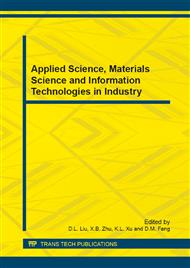[1]
H. Bakht. Survey of Routing Protocols for Mobile Ad-hoc Network [J]. International Journal of Information and Communication Technology Research, 2011, 1(6): 258-270.
Google Scholar
[2]
Y. Cai, X.F. Wang, Z. Li, et al. Delay and Capacity in MANETs under Random Walk Mobility Model [J]. Wireless Networks, 2013, Available from: http: /link. springer. com/article/10. 1007%2Fs 11276-013-0617-6.
DOI: 10.1007/s11276-013-0617-6
Google Scholar
[3]
S. Sukumaran and J. Venkatesh. A Survey of Methods to Mitigate Selfishness in Mobile Ad hoc Networks [J]. International Journal of Information and Communication Technology Research, 2011, 1(2): 73-80.
Google Scholar
[4]
S. Djahel, F. Nait-Abdesselam and Z. Zhang. Mitigating Packet Dropping Problem in Mobile Ad hoc Networks: Proposals and Challenges [J]. Communications Surveys & Tutorials, 2011, 13(4): 1-15.
DOI: 10.1109/surv.2011.072210.00026
Google Scholar
[5]
K. Wang, M. Wu, C. Ding, et al. Game-based Modeling of Node Cooperation in Ad Hoc Networks [A]. Proceedings of WOCC 2010 [C]. Piscataway: IEEE Computer Society, 2010: 1-5.
DOI: 10.1109/wocc.2010.5510684
Google Scholar
[6]
Z. Li and H.Y. Shen. Game-Theoretic Analysis of Cooperation Incentive Strategies in Mobile Ad Hoc Networks [J]. IEEE Transactions on Mobile Computing, 2012, 11(8): 1287-1303.
DOI: 10.1109/tmc.2011.151
Google Scholar
[7]
L. Gyarmati and T.A. Trinh. Cooperative Strategies of Wireless Access Technologies: A Game-theoretic Analysis [J]. Pervasive and Mobile Computing, 2011, 7(5): 545-658.
DOI: 10.1016/j.pmcj.2010.11.006
Google Scholar
[8]
L. Buttyan and J.P. Hubaux. Enforcing Service Availability in Mobile Ad-Hoc WANs [A]. Proceedings of MobiHoc 2000 [C]. Boston: IEEE/ACM Press, 2000: 87-96.
DOI: 10.1109/mobhoc.2000.869216
Google Scholar
[9]
L. Buttyan and J.P. Hubaux. Stimulating Cooperation in Self-organizing Mobile Ad hoc Networks [J]. ACM Journal for Mobile Networks, 2003, 8(5): 579-592.
Google Scholar
[10]
E. Fratkin, V. Vijayaraghavan, Y. Liu, et al. Participation Incentives for Ad Hoc Networks [EB/OL]. (2001).
Google Scholar
[2012]
http: /www. stanford. edu/yl314/ape/paper. ps.
Google Scholar
[11]
S. Zhong, J. Chen and Y.R. Yang. Sprite: A Simple, Cheap-Proof, Credit-Based System for Mobile Ad-Hoc Networks [A]. Proceedings of INFOCOM 2003 [C]. Piscataway: IEEE Press, 2003: 1987-(1997).
DOI: 10.1109/infcom.2003.1209220
Google Scholar
[12]
D. Wen, Y. Cai and Z. Li. Two-hop Incentive Compatible Routing Protocol in Disruption- Tolerant Networks [J]. Journal of Computer Applications, 2013, 33(6): 1500-1504.
DOI: 10.3724/sp.j.1087.2013.01500
Google Scholar
[13]
Y.W. Wang, V.C. Giruka and M Singhal. A Fair Distributed Solution for Selfish Nodes Problem in Wireless Ad Hoc Networks [J]. Lecture Notes in Computer Science, 2004, 3158(630): 211-224.
DOI: 10.1007/978-3-540-28634-9_17
Google Scholar
[14]
S.K. Makki and K.B. Bonds. Enhancing Node Cooperation in Mobile Ad Hoc Network [J]. Journal of Networks, 2013, 8(3): 645-649.
DOI: 10.4304/jnw.8.3.645-649
Google Scholar
[15]
S. Marti, T. Giuli, K. Lai, et al. Mitigating Routing Misbehavior in Mobile Ad hoc Networks [A]. Proceedings of MobiCom 2000 [C]. New York: IEEE/ACM Press, 2000: 255-265.
DOI: 10.1145/345910.345955
Google Scholar
[16]
S. Buchegger, J.Y.L. Boudec. Nodes Bearing Grudges: Towards Routing Security, Fairness and Robustness in Mobile Ad hoc Networks [A]. Proceedings of Euromicro Workshop on PDP 2002 [C]. Spain: IEEE Computer Society, 2002: 403-410.
DOI: 10.1109/empdp.2002.994321
Google Scholar
[17]
P. Michiardi and R. Molva. Core: A Collaborative Reputation Mechanism to Enforce Node Cooperation in Mobile Ad Hoc Networks [A]. Proceedings of IFIP 2002 [C]. New York: ACM Press, 2002: 107-121.
DOI: 10.1007/978-0-387-35612-9_9
Google Scholar
[18]
E. Hernández-Orallo, O.M.D. Serrat, J. -C. Cano, et al. Improving Selfish Node Detection in MANETs Using a Collaborative Watchdog [J]. IEEE Communications Letters, 2012, 16(5): 642–645.
DOI: 10.1109/lcomm.2012.030912.112482
Google Scholar
[19]
E. Hernández-Orallo, O.M.D. Serrat, J. -C. Cano, et al. Evaluation of Collaborative Selfish Node Detection in MANETs and DTNs [A]. Proceedings of MSWiM 2012 [C]. New York: ACM Press, 2012: 159-166.
DOI: 10.1145/2387238.2387266
Google Scholar
[20]
S. Bansal and M. Baker. Observation-based Cooperation Enforcement in Ad hoc Network [R]. California: Stanford University, (2003).
Google Scholar
[21]
M.T. Refaei, V. Srivastava, L. DaSilva, et al. A Reputation-based Mechanism for Isolating Selfish Nodes in Ad Hoc Networks [A]. Proceedings of MobiQuitous 2005 [C]. Washington D.C.: IEEE Computer Society, 2005: 3-11.
DOI: 10.1109/mobiquitous.2005.7
Google Scholar
[22]
Z.J. Xu, Q. Hu, Y.J. Zhang, et al. Trust Evaluation Routing Protocol to Enforce Cooperation in Mobile Ad hoc Networks [J]. Journal on Communications, 2012, 33(7): 27-35.
Google Scholar
[23]
R. Axelrod. The evolution of cooperation [M]. USA: Basic Books, (1984).
Google Scholar
[24]
V. Srinivasan, P. Nuggehalli, C.F. Chiasserini, et al. Cooperation in Wireless Ad Hoc Network [A]. Proceedings of INFOCOM 2003 [C]. Piscataway: IEEE Press, 2003: 808-817.
DOI: 10.1109/infcom.2003.1208918
Google Scholar
[25]
Y.X. Sun, Y.F. Zhao, Y. Li, et al. On Incentive Strategies for Trust Recommendations in Wireless Ad Hoc Networks with Probability Game [J]. Computer Science, 2011, 38(4): 65-71.
Google Scholar
[26]
J.J. Liu, X.H. Jiang, R. Miura, et al. Optimal Forwarding Games in Mobile Ad Hoc Networks with Two-Hop f-cast Relay [J]. IEEE Journal on Selected Areas in Communications, 2012, 30(11): 2169-2179.
DOI: 10.1109/jsac.2012.121209
Google Scholar
[27]
J.J. Jaramillo and R. Srikant. A Game Theory Based Reputation Mechanism to Incentivize Cooperation in Wireless Ad hoc Networks [J]. Ad Hoc Networks, 2010, 8(4): 416-429.
DOI: 10.1016/j.adhoc.2009.10.002
Google Scholar
[28]
D.E. Charilas, K.D. Georgilakis and A.D. Panagopoulos. ICARUS: Hybrid Incentive Mechanism for Cooperation Stimulation in Ad Hoc Networks [J]. Ad Hoc Networks, 2012, 10(6): 976-989.
DOI: 10.1016/j.adhoc.2011.12.010
Google Scholar
[29]
F. Wu, S. Zhong, C.M. Qiao, et al. A Game-Theoretic Approach to Stimulate Cooperation for Probabilistic Routing in Opportunistic Networks [J]. IEEE Trans. Wireless Communications, 2013, 12(4): 1573-1583.
DOI: 10.1109/twc.2013.022113.120282
Google Scholar
[30]
K. Wang and M. Wu. Nash Equilibrium of Node Cooperation Based on Metamodel for MANETs [J]. Journal of Information Science & Engineering, 2012, 28(2): 317-333.
Google Scholar
[31]
S. Zhong and F. Wu. On Designing Collusion-resistant Routing Schemes for Non-cooperative Wireless Ad Hoc Networks [A]. Proceedings of Mobicom 2007 [C]. New York: ACM Press, 2007: 278-289.
DOI: 10.1145/1287853.1287887
Google Scholar
[32]
R. Kalaiarasi and D. Sridharan. Performance Improvement of Mobile Ad Hoc Network Using Particle Swarm Optimization [J]. Journal of Computational Information Systems, 2013, 9(11): 4213-4221.
Google Scholar


